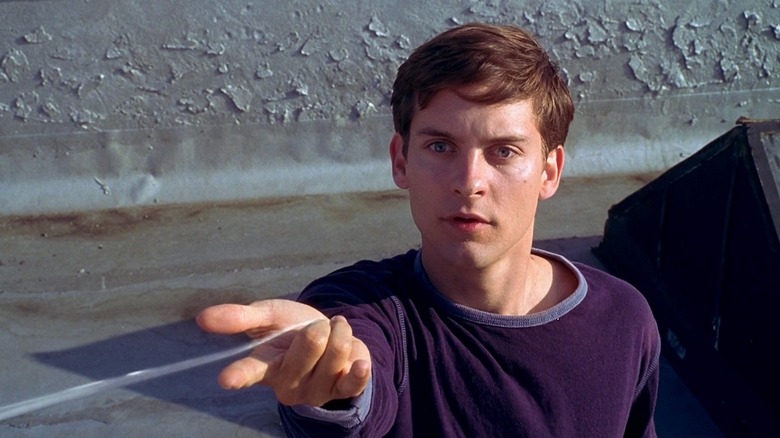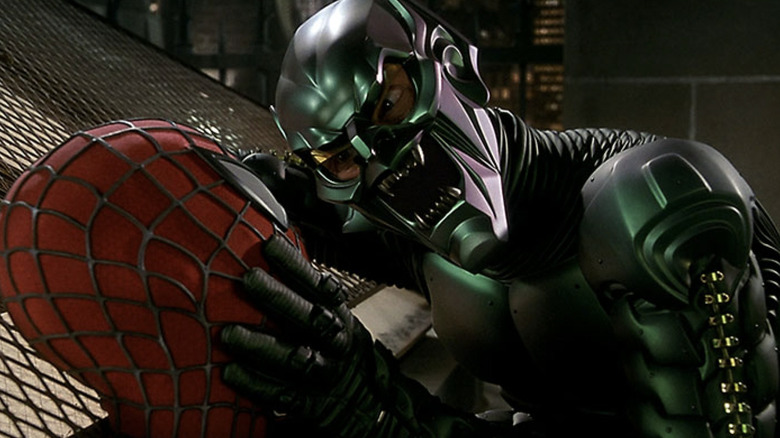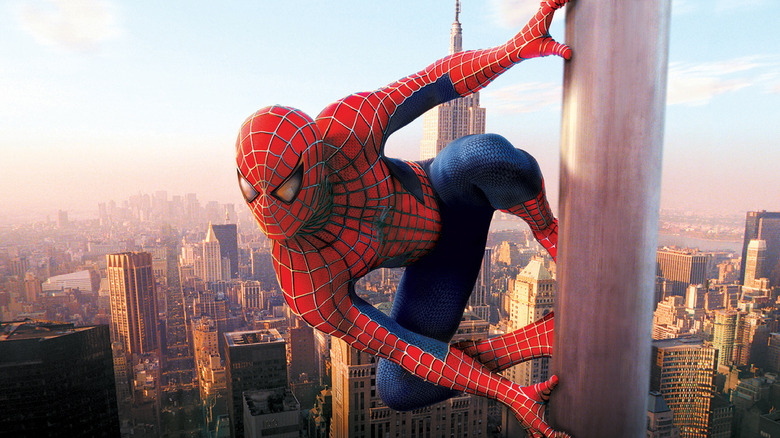The Ridiculous Reasons Spider-Man Fans Got Mad Online At Sam Raimi
Ah, the internet. On the one hand, there's no denying how at least part of the initial dream of a truly interconnected, global community has come to fruition. More marginalized voices have the ability to make themselves heard and individuals who may never have found others who share their interests are free to engage with a healthy assortment of diverse perspectives. On the other, it's probably not all that controversial to propose that this vast digital space is directly responsible for causing endless amounts of anxiety, miscommunication, and pain — all of which would have to be classified as, well, wholly unnecessary. This, unfortunately, is a story about the latter.
When filmmaker Sam Raimi stepped up to direct 2002's "Spider-Man," neither he nor anyone involved could've ever imagined how passionate fans would make their vocal opinions known about the upcoming superhero movie — let alone how this would serve as an early precursor to what's now become frighteningly commonplace on Twitter and social media in general.
The late 1990s and early 2000s quickly became a sort of Wild West as far as fans interacting with and responding to their favorite franchises, in real-time. As George Lucas and several of his cast members from "The Phantom Menace" found out in the most painful way possible, this direct access ultimately proved to be far more trouble than it was worth. But the genie was well out of the bottle at that point, and the ever-growing collection of online fans soon set their sights on another nerd-friendly franchise a few short years later: "Spider-Man."
'An internet culture that was just starting to flex its ability to be ugly'
In a recent retrospective oral history with Variety discussing all facets of production of the Tobey Maguire and Kirsten Dunst-starring superhero film, Raimi, screenwriter David Koepp, and then-head of Columbia Pictures Amy Pascal weighed in on the surreal reality surrounding one of the more controversial elements of "Spider-Man" — the fact that Peter Parker's web shooters, traditionally a device that the boy genius designed himself to swing from skyscraper to skyscraper, would instead be (gasp!) organic in the live-action adaptation. A leftover from James Cameron's original pass on the story, Raimi found this change appealing enough to maintain in the final film ... and when word of this leaked to the public ahead of filming, fans took to the (digital) streets to voice their displeasure en masse. As Raimi himself admitted, "I was aware of it, and it wasn't a good thing for me. I didn't have a great experience of the fans."
Koepp went even further to describe his perspective of the "ugly" situation:
"There was an internet culture that was just starting to flex its ability to be ugly. That was probably my first experience with what we've come to deal with all the time now, which is the distraction of people telling you what they think your movie should be before, during, and after you're making it, and doing it very publicly."
Of course, never mind that such a seemingly drastic change to "Spider-Man" lore came with a very specific storytelling purpose. In another holdover from Cameron's original treatment, Koepp detailed to Variety how, "[he] pushed the metaphor of adolescent sexual development really far," further establishing the organic web shooters as an integral part of the teenage Peter's puberty intersecting with his spider-powers. Like the villainous Green Goblin himself, fans rebelled at the very idea of not getting exactly what they wanted. Does that sound familiar?
'People had a lot of opinions about what we should and shouldn't do'
"People had a lot of opinions about what we should and shouldn't do, who we should hire as the director, who we should hire to play Peter, everything else. But it was nothing in comparison to what it's like now," according to Amy Pascal. Indeed, the creative team's experience on "Spider-Man" arguably paled in comparison to later controversies, such as the notorious backlash to Daniel Craig being cast as (double gasp!) a blonde James Bond ahead of 2006's "Casino Royale" or, even more recently, the outrage over Robert Pattinson's casting as Bruce Wayne in "The Batman." In both cases, we saw what the online outrage amounted to in the end — not much at all.
Because there really is nothing new under the sun and history is doomed to repeat itself infinitely, Raimi actually recalls all the fan-driven campaigns to have him taken out of the director's chair altogether. Imagine! As if the man behind several incredible movies like "The Evil Dead" and "Army of Darkness" had no idea what he was doing. He said:
"I don't think that the fans thought I was the right person to direct 'Spider-Man' in general. And then the organic web shooters — when the fans found out I was going that way, they tried to have me removed from the picture."
Thankfully, it wouldn't take very long for the most vocal complainers to end up eating all their words — and then some. "Spider-Man 2," largely considered the peak of superhero movies, would go a step further and neatly incorporate those organic web shooters into its "Spider-Man No More" storyline, taking away Peter's powers in one of the most powerful live-action sequences in all of Marvel history.
With Sam Raimi returning to superheroes with the upcoming "Doctor Strange in the Multiverse of Madness," the director can rest assured that history is very much on his side now that we're two whole decades removed from "Spider-Man." But the next time a visionary filmmaker sets out to incorporate a major change to a popular IP, hopefully fans will give them the benefit of the doubt ... or maybe not. It is the internet, after all!


